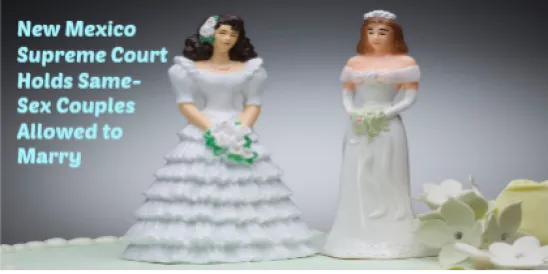The State of New Mexico “is constitutionally required to allow same-gender couples to marry and must extend to them the rights, protections, and responsibilities that derive from civil marriage under New Mexico law,” the New Mexico Supreme Court has held in a landmark decision. Griego v. Oliver, No. 34,306 (N.M. Dec. 19, 2013).
This ruling has far-reaching implications for employers in New Mexico in terms of employee benefits and permitted reasons for leave, among other things. The Court directed that all New Mexico statutes, rules, regulations or the common law that refer to “husband, wife, spouse, family, immediately family, dependent, next of kin, widow, widower or any other word, which, in context, denotes a marital relationship, the same shall apply to same-gender couples who choose to marry.” It also ordered that gender-neutral language be used in New Mexico’s statutory marriage license application form. Employers must ensure compliance with this new law by uniformly applying their policies and procedures to both same-gender and opposite-gender married couples.
The ruling came in a case brought by same-gender couples in long-term, committed relationships. They argued that they had a constitutional right under the Due Process and Equal Protection provisions of New Mexico’s Bill of Rights to enter into civil marriages, and to enjoy the rights, protections, and responsibilities of marriage; therefore, the state’s failure to recognize same-gender civil marriages deprives them of the rights, protections, and responsibilities available to opposite-sex couples violates the New Mexico Constitution.
The Court agreed with the plaintiffs, holding that “although none of New Mexico’s marriage statutes specifically prohibit same-gender marriages, when read as a whole, the statutes have the effect of precluding same-gender couples from marrying and benefitting from the rights, protections, and responsibilities that flow from a civil marriage.”
Opponents of same-gender marriage argued that defining marriage to prohibit same-gender marriages is related to “the important, overriding, governmental interests of ‘responsible procreation and childrearing’.” The Court rejected this contention, stating that procreation has never been a condition of marriage in New Mexico. The Court pointed out that New Mexico recognizes the right of same-gender couples to raise children. It concluded that “the purpose of New Mexico marriage laws is to bring stability and order to the legal relationship of committed couples by defining their rights and responsibilities as to one another, their children if they choose to raise children together, and their property.” The Court continued, “Therefore, barring individuals from marrying and depriving them of the rights, protections, and responsibilities of civil marriage solely because of their sexual orientation violates the Equal Protection Clause . . . of the New Mexico Constitution.” Accordingly, the Court held that “the State of New Mexico is constitutionally required to allow same-gender couples to marry and must extend to them the rights, protections, and responsibilities that derive from civil marriage under New Mexico law.”
The Court further held that “‘civil marriage’ shall be construed to mean the voluntary union of two persons to the exclusion of all others.” Finally, it held that “all rights, protections, and responsibilities that result from the marital relationship shall apply equally to both same-gender and opposite-gender married couples.”









 />i
/>i

